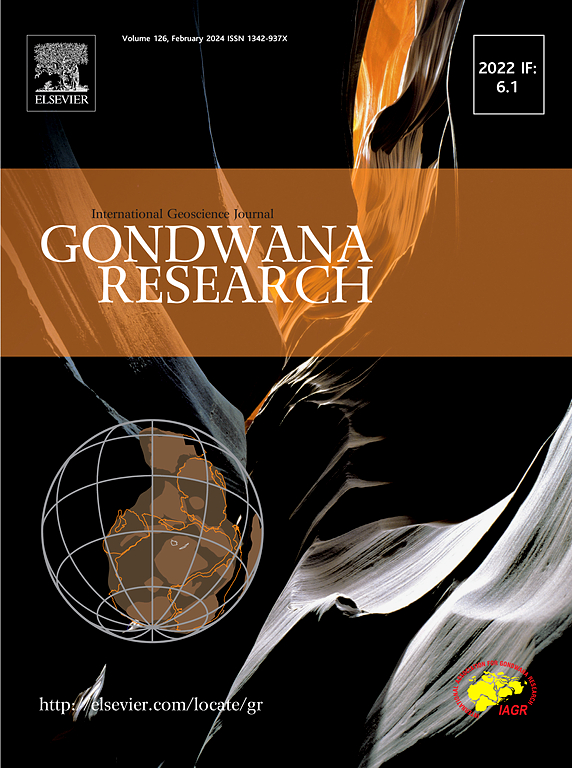Achieving net-zero carbon emission targets in OECD countries: The role of the energy transition, institutional quality, and green technological innovation
IF 7.2
1区 地球科学
Q1 GEOSCIENCES, MULTIDISCIPLINARY
引用次数: 0
Abstract
This study looks at the effects of energy transition, green innovation, and institutional quality on carbon dioxide (CO2) emissions in 35 Organization for Economic Cooperation and Development (OECD) countries from 1990 to 2020. We analyse the driving factors of CO2 emissions by comparing two recently developed indices for the energy transition: the green quality of the energy mix (GREENQ) and the energy transition index (ETI). The augmented Anderson-Hsiao (AAH) estimator for dynamic short-time-period panels is an innovative technique for estimating panel data used in this study. Results reveal that the energy transition directly controls CO2 emissions for the GREENQ index, but institutional quality does not moderate the relationship between the GREENQ index and CO2 emissions. However, ETI augments the CO2 emissions process, and institutional quality moderates the relationship between ETI and CO2 emissions, helping to reduce carbon emissions. Institutional quality also plays a direct role in CO2 emissions mitigation. Additionally, green technological innovation is another driving factor that minimises pollution levels through CO2 emissions mitigation. The study findings suggest the need for a policy framework that coordinates climate change adaptation and mitigation measures to achieve the UN’s Sustainable Development Goals.

实现经合组织国家净零碳排放目标:能源转型、制度质量和绿色技术创新的作用
本研究着眼于1990年至2020年35个经济合作与发展组织(OECD)国家的能源转型、绿色创新和制度质量对二氧化碳排放的影响。我们通过比较能源结构绿色质量(GREENQ)和能源转型指数(ETI)这两个最近发展起来的能源转型指数来分析二氧化碳排放的驱动因素。本文所采用的增强型安德森-萧(AAH)动态短周期面板估计方法是一种创新的面板数据估计方法。结果表明,能源转型直接控制了GREENQ指数的CO2排放,但制度质量对GREENQ指数与CO2排放的关系没有调节作用。然而,ETI增加了CO2排放过程,而制度质量调节了ETI与CO2排放的关系,有助于减少碳排放。体制质量也在减缓二氧化碳排放方面发挥直接作用。此外,绿色技术创新是通过减少二氧化碳排放将污染程度降至最低的另一个驱动因素。研究结果表明,需要一个政策框架来协调气候变化适应和减缓措施,以实现联合国的可持续发展目标。
本文章由计算机程序翻译,如有差异,请以英文原文为准。
求助全文
约1分钟内获得全文
求助全文
来源期刊

Gondwana Research
地学-地球科学综合
CiteScore
12.90
自引率
6.60%
发文量
298
审稿时长
65 days
期刊介绍:
Gondwana Research (GR) is an International Journal aimed to promote high quality research publications on all topics related to solid Earth, particularly with reference to the origin and evolution of continents, continental assemblies and their resources. GR is an "all earth science" journal with no restrictions on geological time, terrane or theme and covers a wide spectrum of topics in geosciences such as geology, geomorphology, palaeontology, structure, petrology, geochemistry, stable isotopes, geochronology, economic geology, exploration geology, engineering geology, geophysics, and environmental geology among other themes, and provides an appropriate forum to integrate studies from different disciplines and different terrains. In addition to regular articles and thematic issues, the journal invites high profile state-of-the-art reviews on thrust area topics for its column, ''GR FOCUS''. Focus articles include short biographies and photographs of the authors. Short articles (within ten printed pages) for rapid publication reporting important discoveries or innovative models of global interest will be considered under the category ''GR LETTERS''.
 求助内容:
求助内容: 应助结果提醒方式:
应助结果提醒方式:


